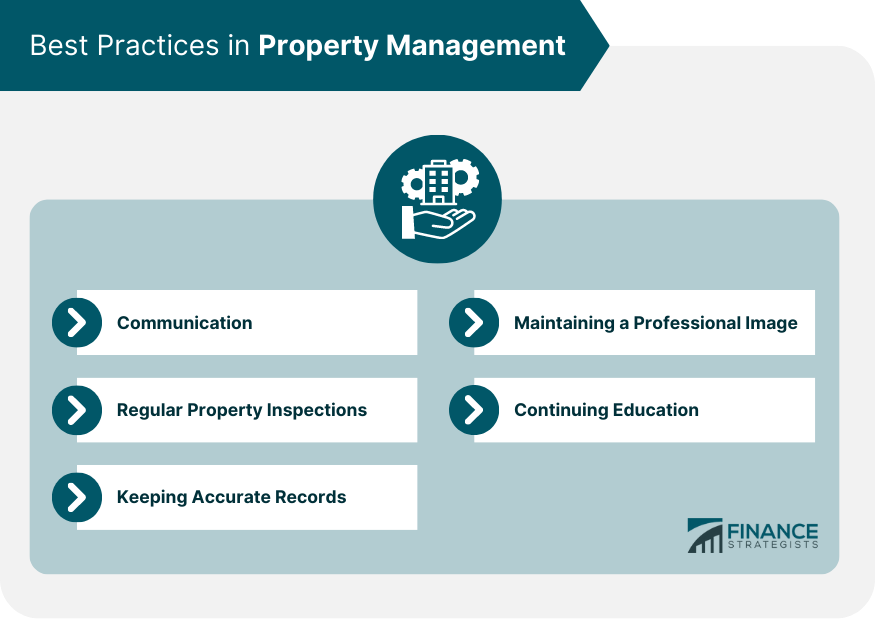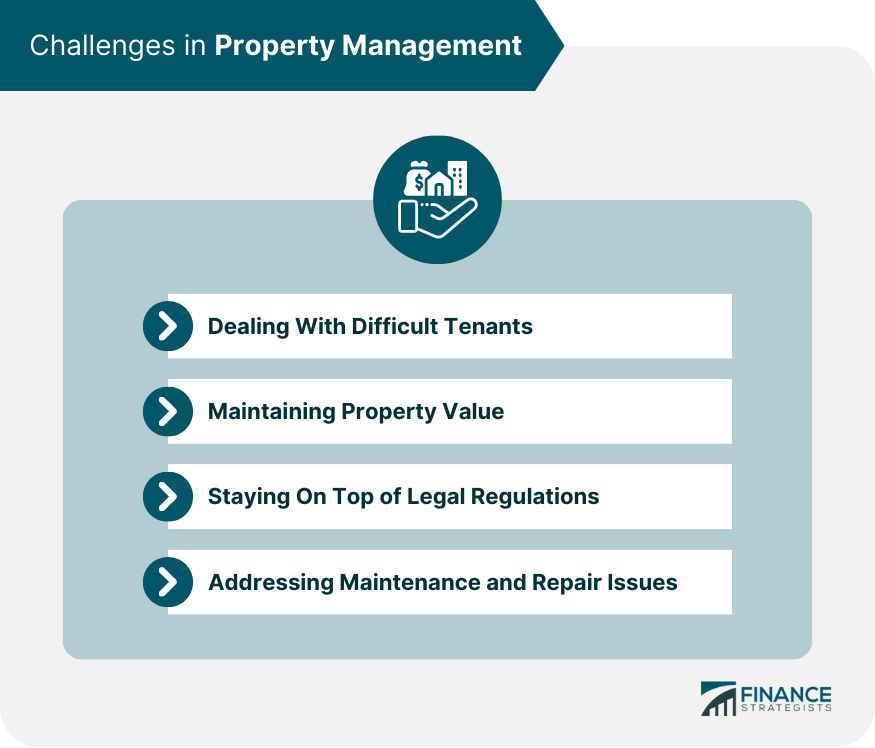Property management refers to the administration, operation, and oversight of real estate properties, including residential, commercial, and industrial buildings. This can include tasks such as rent collection, lease agreement negotiation and enforcement, property maintenance and repairs, tenant relations, and financial reporting. Property managers are responsible for a wide range of tasks, including property maintenance, tenant relations, rent collection and financial management, marketing and advertising, and legal compliance. Effective property management is essential for maintaining the value of real estate investments and ensuring a positive tenant experience. Property managers can help to improve the operational efficiency of real estate properties and maximize returns for owners. Residential properties are the most common type of property managed by property managers. These may include single-family homes, multi-family buildings, and apartment complexes. Commercial properties may include office buildings, retail spaces, and warehouses. Property managers for commercial properties may have specialized knowledge and experience in dealing with commercial tenants and leases. Industrial properties may include factories, manufacturing plants, and distribution centers. Property managers for industrial properties may have specialized knowledge and experience in dealing with maintenance and repair issues related to industrial equipment and machinery. Mixed-use properties may include a combination of residential, commercial, and industrial spaces. Property managers for mixed-use properties must have knowledge and experience in dealing with a wide range of tenant types and lease agreements. Property managers are responsible for ensuring that properties are properly maintained and that all necessary repairs and upgrades are completed in a timely manner. Property managers must maintain positive relationships with tenants and address any concerns or issues that may arise. This may include responding to maintenance requests, addressing noise complaints, and handling tenant disputes. Property managers are responsible for collecting rent and ensuring that all financial obligations related to the property are met. This may include paying property taxes, insurance premiums, and mortgage payments. Property managers must effectively market and advertise properties to attract new tenants and fill vacancies. This may include advertising through online listings, social media, and other channels. Property managers must ensure that properties are in compliance with all applicable laws and regulations. This may include complying with building codes, environmental regulations, and fair housing laws. Hiring a property manager can be beneficial for owners who lack the time, expertise, or desire to manage their own properties. Property managers can handle tasks such as advertising vacancies, screening tenants, collecting rent, and responding to maintenance requests. They also have knowledge of local laws and regulations, which can help owners avoid legal issues. Another reason to hire a property manager is to maximize returns on investment. A property manager can help owners identify ways to increase revenue, such as implementing cost-effective maintenance plans or adjusting rent prices based on market trends. When searching for a property manager, owners should look for someone with experience managing properties similar to their own. This can include factors such as property type, location, and size. Referrals from other property owners or real estate professionals can also be a valuable source of information. In addition, owners should look for property managers with a strong track record of success. This can be evaluated by reviewing past performance metrics, such as vacancy rates and rent collection rates, and by conducting background checks and verifying professional certifications. Owners should conduct a thorough interview process to evaluate property manager candidates. This may include asking questions about their experience, qualifications, and approach to property management. For example, owners may ask about their tenant screening process, maintenance plans, and communication strategies. It is also important for owners to evaluate the property manager's communication skills and responsiveness, as effective communication is essential for a successful working relationship. Finally, owners should review the property management contract carefully and ensure that they are comfortable with the terms and fees before entering into an agreement with a property manager. Effective communication is key to successful property management. Property managers should maintain open lines of communication with tenants, owners, and other stakeholders. Regular property inspections can help property managers to identify maintenance and repair issues before they become major problems. This can help to improve tenant satisfaction and reduce maintenance costs. Accurate record-keeping is essential for effective property management. Property managers should maintain detailed records of financial transactions, tenant interactions, and maintenance and repair activities. Property managers should maintain a professional image and demeanor at all times. This can help to build trust and credibility with tenants and owners. Property managers should continue to educate themselves and stay up-to-date on industry trends and best practices. This can help to improve their effectiveness as property managers and ensure that they are providing the highest level of service to owners and tenants. Dealing with difficult tenants can be one of the biggest challenges faced by property managers. This may include tenants who fail to pay rent, violate lease terms, or cause damage to the property. Property managers must work to maintain the value of properties over time. This may include implementing regular maintenance and repair plans, making upgrades and improvements to the property, and staying up-to-date on market trends and demand. Property managers must stay on top of all applicable laws and regulations related to property management. Failure to do so can result in legal disputes and financial penalties. Maintenance and repair issues are a constant challenge for property managers. They must work to ensure that all issues are addressed in a timely and cost-effective manner, while also prioritizing tenant satisfaction and maintaining the value of the property. Property management is a critical component of real estate investing, involving the management and oversight of properties on behalf of owners. Property managers are responsible for a wide range of tasks, including property maintenance, tenant relations, rent collection and financial management, marketing and advertising, and legal compliance. Effective property management is essential for maximizing the returns on real estate investments and ensuring a positive tenant experience. Owners should carefully evaluate their options when hiring a property manager, and work closely with their property manager to develop and implement a comprehensive management plan. By following best practices and staying on top of industry trends and regulations, property managers can help to ensure the long-term success of their properties.What Is Property Management?
Types of Properties Managed
Residential Properties
Commercial Properties
Industrial Properties
Mixed-Use Properties
Roles and Responsibilities of Property Managers
Property Maintenance
Tenant Relations
Rent Collection and Financial Management
Marketing and Advertising
Legal Compliance
Hiring a Property Manager
Reasons to Hire a Property Manager
Finding a Qualified Property Manager
Interviewing Property Manager Candidates
Best Practices in Property Management
Communication
Regular Property Inspections
Keeping Accurate Records
Maintaining a Professional Image
Continuing Education

Challenges in Property Management
Dealing With Difficult Tenants
Maintaining Property Value
Staying on Top of Legal Regulations
Addressing Maintenance and Repair Issues

Final Thoughts
Property Management FAQs
Property management refers to the operation, control, and maintenance of real estate properties on behalf of owners.
Property management ensures that properties are well-maintained, tenants are satisfied, and owners are earning revenue. It also helps to protect property values and comply with legal requirements.
Properties managed in property management include residential, commercial, industrial, and mixed-use properties.
Property managers are responsible for property maintenance, tenant relations, rent collection and financial management, marketing and advertising, and legal compliance.
Some challenges faced by property managers include dealing with difficult tenants, maintaining property value, staying on top of legal regulations, and addressing maintenance and repair issues.
True Tamplin is a published author, public speaker, CEO of UpDigital, and founder of Finance Strategists.
True is a Certified Educator in Personal Finance (CEPF®), author of The Handy Financial Ratios Guide, a member of the Society for Advancing Business Editing and Writing, contributes to his financial education site, Finance Strategists, and has spoken to various financial communities such as the CFA Institute, as well as university students like his Alma mater, Biola University, where he received a bachelor of science in business and data analytics.
To learn more about True, visit his personal website or view his author profiles on Amazon, Nasdaq and Forbes.















